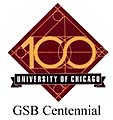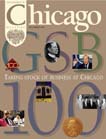The University of Chicago Magazine
December 1997

![]()
Enter W. Allen Wallis, X'35, then the chair of the statistics department. Wallis became the school's eighth dean in 1956, with James Lorie, PhD'47, taking up the associate deanship. The two set out to rebuild the school, ideologically and physically. Reviving and revising the philosophies of Laughlin and Marshall, they worked to create a broad curriculum that would provide students with the critical and creative skills needed to succeed in a continually changing business environment. In 1957-the same year that Kimpton bemoaned the ailing Nellie-they approached the Ford Foundation with a 10-year plan, and were rewarded with a grant of nearly $1.4 million.
By the time Wallis and Lorie stepped down in the early 1960s, they had ex-panded the school into the lower two floors of Stuart Hall, more than doubled the on-campus M.B.A. enrollment, and brought the number of Ph.D. candidates up to greater than 70. The number of faculty had more than doubled and featured such recruits as George Stigler, PhD'38, and future deans George P. Shultz and Sidney Davidson. The Wallis-Lorie team also created a student placement center and organized an advisory committee of prominent business-people, now known as the Council on the Graduate School of Business-for the School of Business was renamed for a final time in 1959.
The GSB continued to flourish under George Shultz, dean from 1962 to 1969. Research centers for accounting, health administration studies, and mathematical studies in business and economics were established, and the GSB began an international program with the London School of Economics and the Catholic University of Louvain in Belgium. Shultz also collaborated with major corporations to design a program and establish fellowships to en-courage African Americans to enter business and attend the GSB. When Shultz left to become President Richard M. Nixon's secretary of labor (later he would also serve as secretary of state under President Ronald Reagan), the school was in the middle of a renovation plan he had initiated that resulted in the business school's acquisition of Rosenwald Hall, built in 1915 to house the geology and geography de-partments.
By the time of the 18th annual Management Conference in 1970, the Graduate School of Business had become a major force. "The accomplishments of my two immediate predecessors and their colleagues loom large," new dean Sidney Davidson told his audience at the conference. "The School has grown into an institution of world eminence, generally acknowledged to be among the leaders and pace-setters of business education-a model for business schools in this country, and abroad."
Not taking that role for granted, the leaders of the GSB in
the 1970s and 1980s added innovations like the New Product Laboratory, where
students could assist businesses in developing and marketing products. George
Stigler claimed the school's first Nobel Prize. With John P. Gould, Jr.,
MBA'63, PhD'66, as dean, the GSB began a weekend M.B.A. program for part-time
students unable to attend evening classes, and reached out to other areas
of the University, establishing joint-degree programs with the Law School,
the Pritzker School of Medicine, the School of Social Service Administration,
area studies departments, and the Physical Sciences Division. Physically,
the school extend-ed across the Midway to the  Edelstone Center,
and by the early 1990s, all the way downtown to what is now named Gleacher
Center for Eric J. Gleach-er, MBA'67, a U of C trustee.
Edelstone Center,
and by the early 1990s, all the way downtown to what is now named Gleacher
Center for Eric J. Gleach-er, MBA'67, a U of C trustee.
This last decade of the GSB's first 100 years will certainly be noted for a string of Nobel Prizes, but perhaps the most far-reaching achievement of the 1990s will have been the GSB's transition to an increasingly global outlook. Under Robert S. Hamada, dean since 1993, the GSB opened its international executive M.B.A. program in Barcelona, Spain, and began offering an on-campus international M.B.A. program that in-cludes specialized coursework and six months working and studying in a foreign country. The international-exchange program founded under Shultz has expanded to include 23 universities in 17 countries.
"As technology shrinks the world of business even further, we will continue to equip our graduates with the skills and experiences they need in a global marketplace," Hamada wrote in a recent letter to business school alumni. "I am committed to making sure the GSB is not lagging behind the globalization trend, but leading it."
History is on his side.
Visit the GSB Centennial Web site. Much of the information in this article comes from Harry Dreiser's A Brief History: The University of Chicago Graduate School of Business. Special thanks to the GSB's alumni relations, communications, and publications staff.
Also:
Pathbreaking Work - Eyes on the Prize - Selling Points
An Enterprising Spirit - Centennial Facts and Figures
